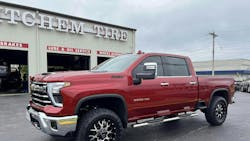Some operational best practices are obvious. Others, including the nuances of employee relations, aren’t as apparent, say tire dealers.
“When we say 'best practices,' I think there’s two things that affect any business,” says Brad Templin: analytics and what he calls “the human element.”
Templin is the chief operating officer at Scott’s U-Save Tires & Auto Repair, a four-location dealership based in the Chicago, Ill., area.
"It doesn’t matter if we are selling tires and repair services or selling vacuum (cleaners), all businesses need to understand their numbers and how they affect overall performance of the business on the ownership and management level."
Templin says he learned that businesses are always judged on their deviation from forecasts.
Being down is looked at in a negative light and always comes with questions. But being up is “equally as important from a management and owner standpoint to understand.
“If we are up 50%, 40% or even 20%, we have to ask ourselves, ‘Is this sustainable? Will we need to hire more people? Are we marketing to the right people? How is our inventory keeping up?'
"These are things business owners need to think about when their businesses are up. People focus on the down, but the up is just as important.”
Templin’s second point? "You have to balance the cold and dryness (of the numbers) with the human element."
Templin says it's important to remember that employees are people, not numbers.
“Everybody who is on your team should be looked at as a team (member) — not in a hierarchy of power,” he explains.
“It’s obviously summertime” and various parts of the country - including the Great Lakes region, where Templin’s dealership is located - “have had some crazy heat. For two weeks of extreme heat, we were down a little bit. Then we looked at why we were down. Was it car count? Productivity?
“Then we looked to see that it was 96 degrees outside, making it 110 degrees inside the shop. Now it was more understandable as to why we were a little slow for those weeks!
"There’s 16 different factors that go into a good work week and there's 16 different factors that go into a bad work week. It’s up to the (dealership's) owner and manager to remember that people are part of a team.”
Templin credits good employee relations at his dealership to the example set by his parents. In 1981, Templin’s father opened the first Scott’s U-Save location as a full-service gas station with two service bays.
In 1993, the dealership moved to a new facility, having outgrown its original building. In 1996, it added began selling tires and doing tire repairs.
“I believe the reason why we are so successful is because my dad was charismatic, friendly and kind,” says Templin. “He became our brand. He treated all his employees equally. It didn’t matter if you were the guy pumping gas or his best salesman.”
Twenty-seven years ago, Templin’s father passed away, leaving Templin’s mother in charge of Scott’s U-Save Tires & Auto Repair.
Being from outside the industry, his mother didn’t have a lot of knowledge about tires and service, but knew she had to surround herself with “great people," says Templin.
“She has done that through her time in the industry and I think when you surround yourself with (good) people ... and show them respect, it will come back” to you.
“I've rarely seen someone who was shown respect and (did) not give it back. If you invest in somebody, in their career, in their advancement and future, does it not come back to you?”
This virtuous circle “is also the only way we can stand out from big box competitors,” he explains.
“We can’t tell customers that our Michelin tires are better than Costco’s Michelin tires. They're both Michelin tires. The only reason customers come to us is (because of) our people.”
Partnering up
“Aside from ... finding the right people and this and that, I think it all comes down to finding the right vendor or a partner that you can grow with,” says Steve Kruse, co-owner at Mitchem Tire Co., a four-location dealership based in Springfield, Mo.
“We’ve been fortunate to have really good relationships with companies like Community Wholesale Tire Inc.,” which is based in St. Louis, Mo., “and we recently joined a container program at Point S USA.”
This allows Kruse’s dealership to compete with big box stores by not having to cut margins.
Choosing a vendor shouldn’t be taken lightly, he explains. “You really want to find a vendor that wants to be your partner rather than just a supplier,” citing his dealership’s longstanding relationship with Community Wholesale Tire as an example of this dynamic.
And the Point S program has been a “great program” for Mitchem Tire. “They offer us the opportunity to purchase direct container loads and use their existing warehouses for fill in products."
Kruse says there are plenty of options out there where independent tire dealers can find support.
“You create a relationship with a sales representative, who then talks to the manufacturers and you can express your concerns, wants and needs and see if you can meet in the middle and come up with a program that benefits not only yourself, but the customer, as well,” says Kruse.
“It really all comes down to fostering those relationships.”
About the Author
Madison Hartline
Associate Editor
Madison Hartline (Gehring) is the associate editor for Modern Tire Dealer and Motor Age. Since joining MTD after graduating from The Ohio State University in 2022, she has taken on the role of managing the brand’s social media strategy, producing podcast episodes and overseeing eNewsletter content.
Don't miss Hartline's next article. Sign up for MTD's newsletter.

